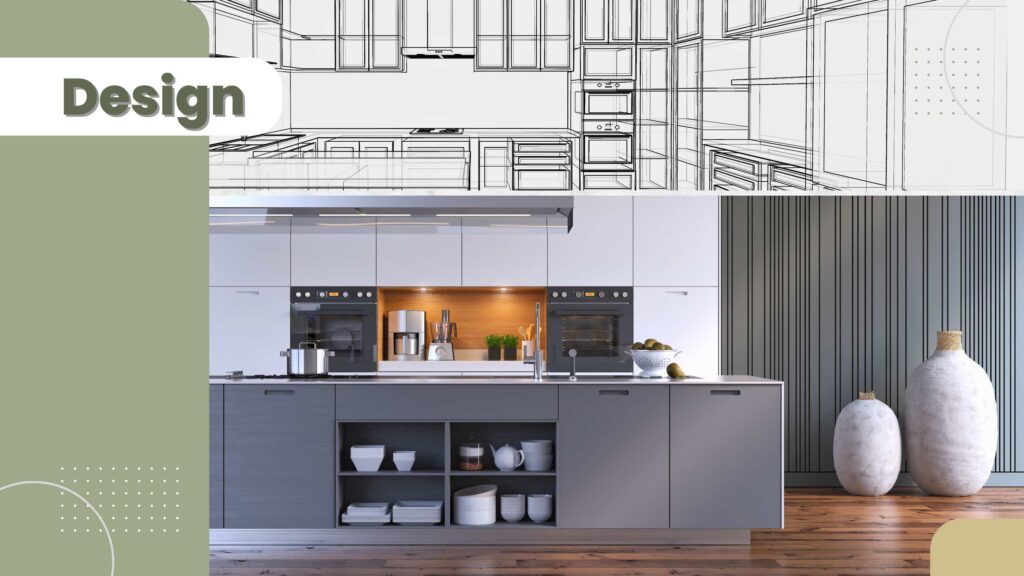
Table of Contents
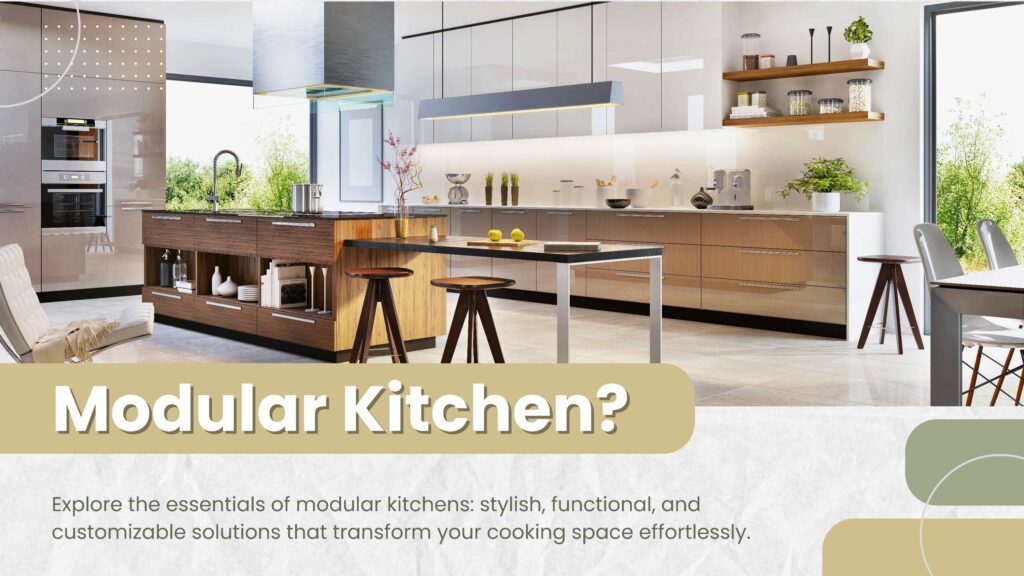
Introduction: What Is a Modular Kitchen?
If you’ve ever dreamed of a kitchen that’s not only functional but also stylish and easy to maintain, you’ve probably heard of the term “modular kitchen.” But what exactly is a modular kitchen, and why is it becoming the go-to choice for modern homes? In simple terms, a modular kitchen is a pre-designed kitchen layout made up of different modules or units, like cabinets, shelves, and drawers. These modules are factory-made and then assembled in your home to create a kitchen that’s tailored to your needs.
The beauty of a modular kitchen lies in its flexibility. Whether you have a small apartment or a spacious home, modular kitchen designs can be customized to fit any space. Plus, they’re available in a wide range of materials, colors, and finishes, so you can create a kitchen that reflects your personal style.
Now, let’s dive into everything you need to know about modular kitchens, from their benefits to how to choose the right design for your home.
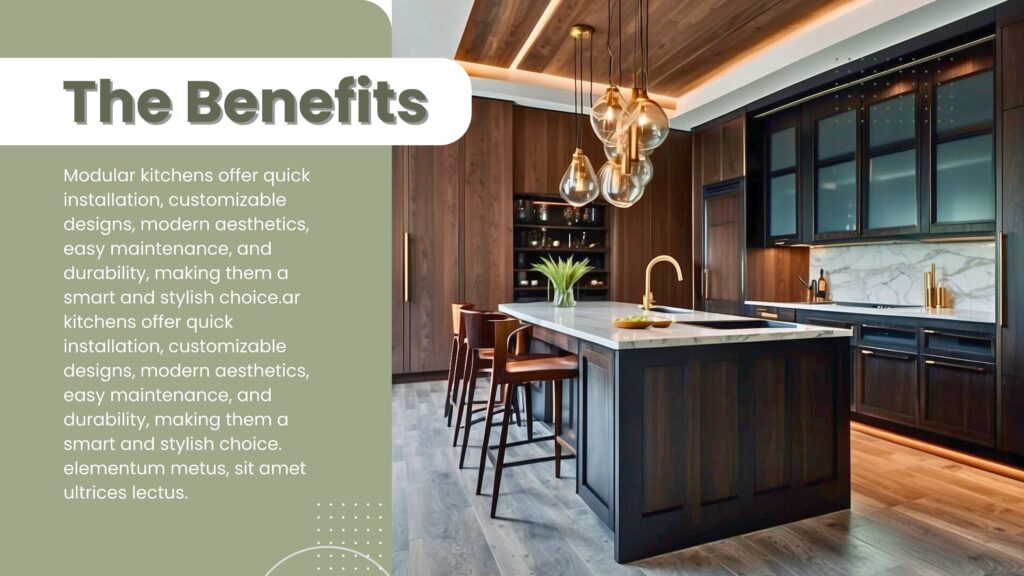
The Benefits of a Modular Kitchen
One of the biggest advantages of a modular kitchen is its convenience. Unlike traditional kitchens, which can take weeks to design and install, a modular kitchen can be set up in just a few days. The units are pre-fabricated, so all that’s left to do is assemble them on-site.
Another major benefit is the ability to customize. Whether you’re a gourmet chef or someone who just needs a functional space to prepare meals, you can design a modular kitchen that suits your specific needs. For example, you can choose to include more storage space if you have a lot of kitchen gadgets or opt for open shelves if you prefer easy access to your dishes.
Additionally, modular kitchens are known for their sleek and modern look. The clean lines and well-organized layout make the space not only beautiful but also incredibly efficient. And let’s not forget about maintenance – modular kitchens are designed for easy cleaning, with materials that resist stains and spills.
Lastly, modular kitchens are built to last. The high-quality materials used in their construction mean they can withstand the wear and tear of daily use, making them a smart investment for any homeowner.
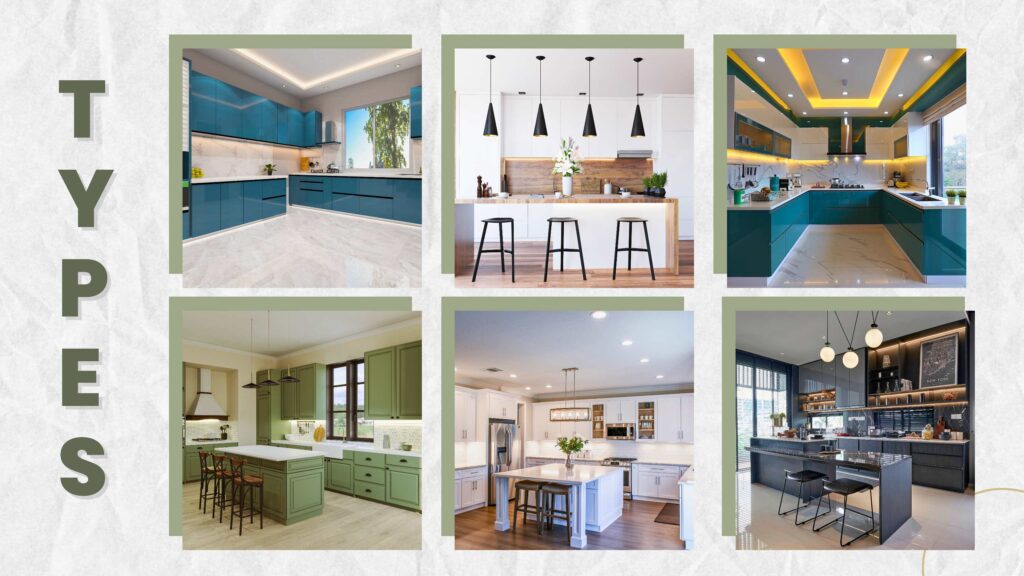
Different Types of Modular Kitchen Layouts
When it comes to modular kitchen designs, there’s no one-size-fits-all solution. The layout you choose should depend on the size and shape of your kitchen, as well as your cooking habits. Here are some popular layouts to consider:
L-Shaped Kitchen
The L-shaped modular kitchen design is ideal for small to medium-sized spaces. It makes the most of corner areas, providing ample counter space and storage without taking up too much room. This layout also allows for easy movement between the stove, sink, and refrigerator, making it highly functional.
U-Shaped Kitchen
If you have a larger kitchen, a U-shaped layout might be the best option. This design offers plenty of counter space and storage, with cabinets and appliances arranged on three sides of the kitchen. It’s perfect for those who love to cook and need a lot of space for meal prep.
Straight-Line Kitchen
For small apartments or studio spaces, a straight-line modular kitchen is a great solution. All the units and appliances are arranged along a single wall, making it a compact yet efficient design. While it may lack the counter space of other layouts, it’s perfect for those who need a functional kitchen without taking up too much space.
Island Kitchen
If you have the luxury of space, an island modular kitchen is a stunning option. This layout features a central island that can be used for additional storage, a breakfast bar, or even a cooking station. It’s an excellent choice for those who entertain frequently and want a kitchen that serves as the heart of the home.
Parallel Kitchen
Also known as a galley kitchen, the parallel layout is perfect for narrow spaces. It features two parallel counters with a walkway in between, making it a highly efficient design. This layout is often preferred by professional chefs because it allows for easy movement between workstations.

Choosing the Right Materials for Your Modular Kitchen
The materials you choose for your modular kitchen play a crucial role in both the aesthetics and functionality of the space. Here’s a breakdown of some popular options:
Cabinets
The cabinets are the most visible part of your modular kitchen, so it’s important to choose a material that’s both durable and attractive. Some common materials include:
- MDF (Medium-Density Fiberboard): A cost-effective option that’s easy to paint or laminate.
- Plywood: Strong and durable, plywood is a popular choice for modular kitchen cabinets.
- Acrylic: For a high-gloss finish that’s easy to clean, acrylic is a top choice.
Countertops
Your countertop needs to be tough enough to withstand daily use, but it should also complement the overall design of your kitchen. Some options include:
- Granite: Durable and heat-resistant, granite is a classic choice for kitchen countertops.
- Quartz: Known for its non-porous surface, quartz is both beautiful and easy to maintain.
- Laminate: A budget-friendly option that comes in a wide range of colors and patterns.
Backsplash
The backsplash is both a functional and decorative element in your modular kitchen. It protects the walls from spills and splatters while adding a pop of color or texture to the space. Some popular materials include:
- Ceramic Tiles: Available in a wide range of colors and patterns, ceramic tiles are easy to clean and maintain.
- Glass: For a sleek and modern look, glass backsplashes are a great option.
- Stainless Steel: If you prefer an industrial look, stainless steel is both durable and stylish.

How to Plan Your Modular Kitchen Design
Planning a modular kitchen requires careful consideration of your needs, space, and budget. Here’s a step-by-step guide to help you get started:
Assess Your Needs
The first step in planning your modular kitchen is to assess your needs. Think about how you use your kitchen and what’s most important to you. Do you need a lot of storage? Do you prefer open shelves or closed cabinets? Do you need a large countertop for meal prep? Answering these questions will help you determine the best layout and features for your kitchen.
Measure Your Space
Next, measure your kitchen space to determine what size and shape of modular kitchen will work best. Be sure to measure the length, width, and height of the room, as well as the location of doors, windows, and electrical outlets. This will help you choose a layout that fits perfectly in your space.
Set a Budget
Setting a budget is crucial when planning a modular kitchen. Modular kitchens can range in price depending on the materials and features you choose, so it’s important to know how much you’re willing to spend. Be sure to factor in the cost of appliances, as well as installation and any additional features you want, such as under-cabinet lighting or a built-in oven.
Choose Your Layout and Materials
With your needs, space, and budget in mind, it’s time to choose your layout and materials. Refer back to the different types of layouts we discussed earlier to see which one best suits your kitchen. Then, select the materials for your cabinets, countertops, and backsplash based on your preferences and budget.
Work with a Professional
While it’s possible to design a modular kitchen on your own, working with a professional can help ensure that the final result meets your expectations. A kitchen designer can help you choose the right layout and materials, as well as oversee the installation process to make sure everything goes smoothly.
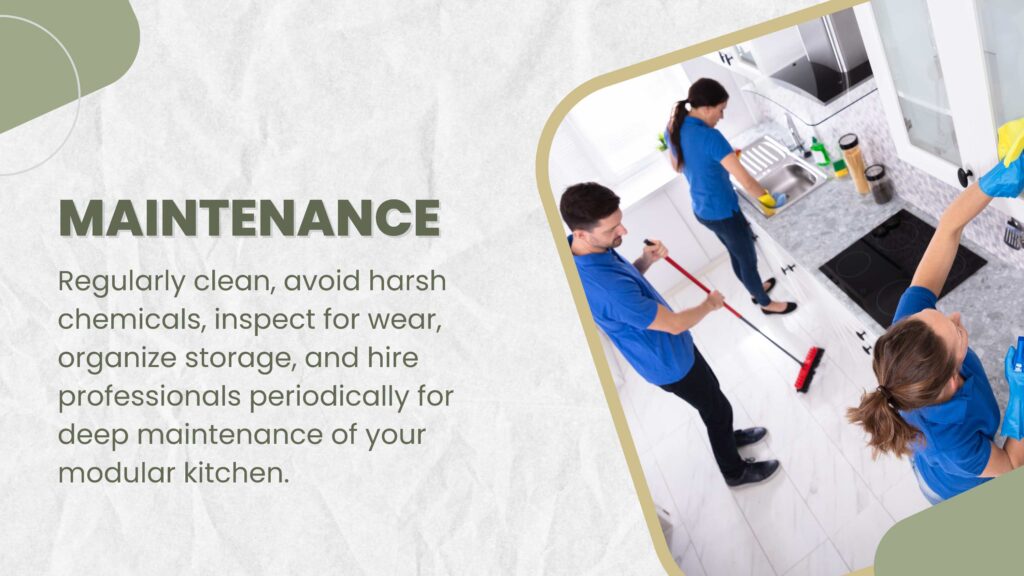
Maintenance Tips for Your Modular Kitchen
One of the many advantages of a modular kitchen is that it’s easy to maintain. However, proper care is still essential to keep it looking its best. Here are some tips to help you maintain your modular kitchen:
Clean Regularly
Regular cleaning is key to maintaining the appearance and functionality of your modular kitchen. Wipe down the cabinets and countertops daily to remove dust and spills. Use a mild detergent and a soft cloth to avoid damaging the surfaces.
Avoid Harsh Chemicals
When cleaning your modular kitchen, avoid using harsh chemicals that can damage the materials. Stick to gentle cleaners and avoid abrasive sponges or scrubbers that can scratch the surfaces.
Inspect for Wear and Tear
Regularly inspect your modular kitchen for any signs of wear and tear. Check for loose cabinet doors, chipped countertops, or any other issues that may need to be addressed. Fixing small problems early can prevent them from becoming larger, more expensive issues down the road.
Organize Your Storage
Keeping your kitchen organized is another important aspect of maintenance. Make sure all items have a designated place and return them to their proper spot after use. This will not only keep your kitchen looking neat but also make it easier to find what you need.
Professional Maintenance
Every few years, consider hiring a professional to inspect and maintain your modular kitchen. They can perform tasks like deep cleaning, polishing, and tightening any loose components to ensure your kitchen stays in top shape.
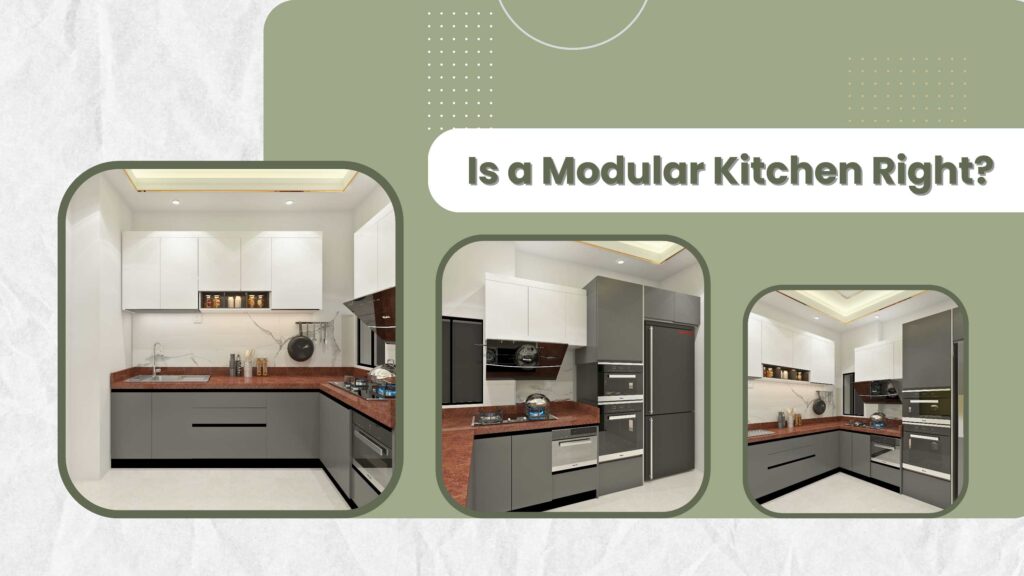
Is a Modular Kitchen Right for You?
Deciding whether a modular kitchen is the right choice for you depends on your lifestyle, budget, and personal preferences. If you value convenience, customization, and a modern aesthetic, then a modular kitchen is likely a great fit for your home. The flexibility in design and ease of installation make it an attractive option for many homeowners.
However, it’s also important to consider your budget and long-term needs. While modular kitchens can be more affordable than custom-built kitchens, they still require an investment. Be sure to weigh the pros and cons carefully and consider consulting with a professional to help you make the best decision.
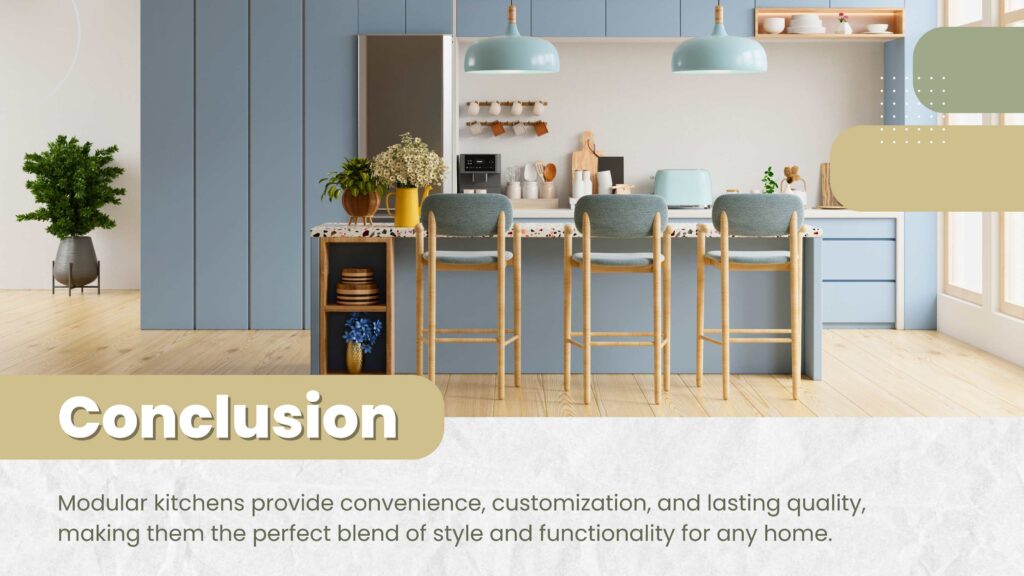
Conclusion: Transform Your Cooking Space with a Modular Kitchen
A modular kitchen offers a perfect blend of style, functionality, and convenience. Whether you’re renovating your current kitchen or designing a new one, understanding the benefits, layouts, and materials of modular kitchen designs will help you create a space that not only meets your needs but also enhances your daily life. With its customizable features, efficient use of space, and modern aesthetics, a modular kitchen is an excellent choice for anyone looking to upgrade their home.

By carefully planning your design, choosing high-quality materials, and following simple maintenance tips, you can enjoy a beautiful and functional kitchen for years to come. So, if you’re ready to transform your cooking space, a modular kitchen might just be the perfect solution for you. It’s not just about cooking; it’s about creating a space that you love and that works for your lifestyle.
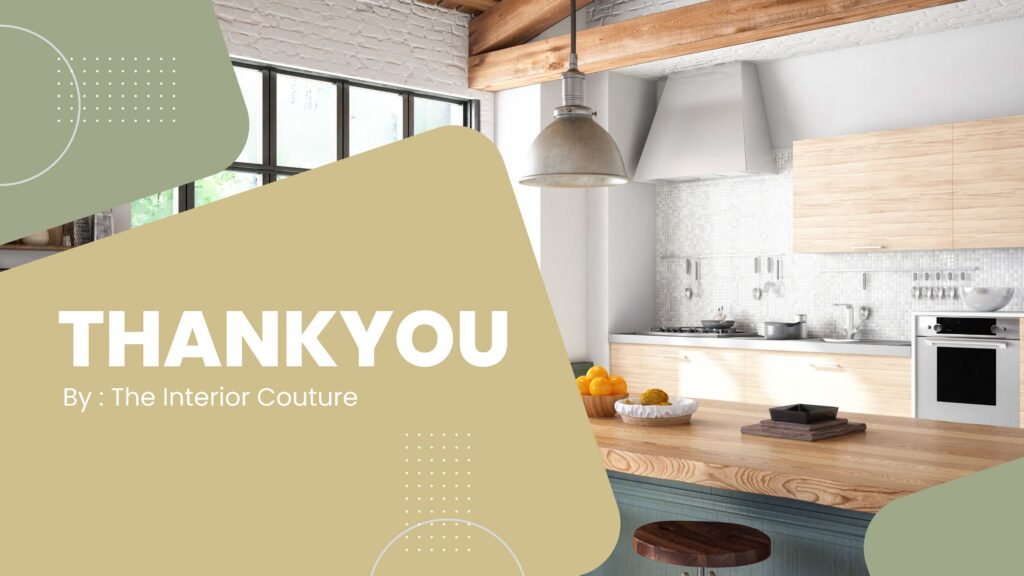





Greetings! Very helpful advice on this article! It is the little changes that make the biggest changes. Thanks a lot for sharing!